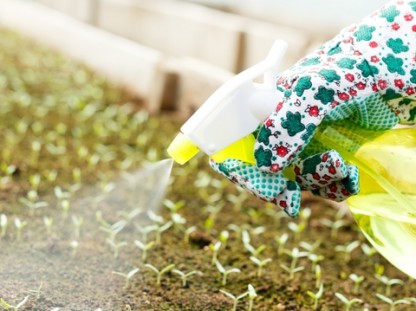The Alarming Link Between Pesticides and Autism
 The third study in a row confirms a link between prenatal exposure to pesticides and autism risk. Researchers at the University of California Davis recently reported that children with autism are 60% more likely than normally developing children to have had pesticides called organophosphates applied near their homes.[1,2]
The third study in a row confirms a link between prenatal exposure to pesticides and autism risk. Researchers at the University of California Davis recently reported that children with autism are 60% more likely than normally developing children to have had pesticides called organophosphates applied near their homes.[1,2]
Dr. Irva Hertz-Picciotto, professor of public health sciences, and her fellow researchers tracked 970 participants in Northern California, the nation’s top region for agricultural production, where hundreds of millions of pounds of pesticides are applied each year. They found that living within 1.25 to 1.75 kilometers of a commercial pesticide application site significantly increased autism and developmental delay risk. The link between autism and pesticide exposure was strongest for people living closest to the sites of pesticide application and weakened as the distance increased.
“What we saw were several classes of pesticides more commonly applied near residences of mothers whose children developed autism or had delayed cognitive or other skills,” she noted.[2]
The three worst pesticides
For one common type of pesticides—organophosphates—the risk was twice as high. For another type— chlorpyrifos—the risk was over three times as high. In addition, children of mothers living near a type of insecticide— pyrethroid—application had an increased risk of between 1.7 to 2.3 times. Organophosphates and pyrethroids are two of the most commonly applied agricultural pesticides.
Dr. Hertz-Picciotto explained that pesticides may be affecting early brain development, when the brain is forming synapses between cells.[2] Overall, the new study’s results add to the accumulating evidence that points to widely used agricultural pesticides as contributing factors to increased risk of developing autism. The same associations have been found in a previous study.[4]
Household pesticides and autism also linked
Pyrethroids are also commonly used in anti-flea and tick shampoos for pets. In a previous study, Dr. Hertz-Picciotto found that, compared with mothers of typically developing children, mothers of children with autism were twice as likely to report that they had shampooed their pets with pyrethrin-containing anti-flea and tick shampoos around the time of their pregnancy.[3]
What to do to reduce pesticide exposure
For now, the study’s authors are advising pregnant woman to limit pesticide exposure as much as possible. If you live near an agricultural area and can move, do so. But it’s also important to limit exposure to household pesticides.
“I would suggest that women who are pregnant or in the process of becoming pregnant avoid using chemicals inside the home,” Dr. Janie Shelton, PhD, another one of the study’s authors from UC Davis, told CNN. “Make sure to read the labels and see if any of these chemicals are in the things they use.”
For any women who are planning to become pregnant or are pregnant, it is a good idea to avoid all household pesticides. According to the FDA, common household pesticides include the following:[5]
- Roach sprays and baits
- Bath and kitchen disinfectants and sanitizers, including bleach
- Rat and other rodent poisons
- Insect repellents
- Products used to kill mold or mildew
- Flea and tick shampoos, powders, and dips for pets
- Weed killers
Alternatives to pesticides
For alternatives to pesticides, see the Northwest Center for Alternative to Pesticide’s Home and Garden Toolbox. And remember that the best way to keep pests out of your home is through prevention. This is most easily accomplished by following these recommendations:
- Install and repair screens on windows and doors.
- Seal cracks around windows and doors with caulk or weather-stripping.
- Inspect groceries and used furniture for insects before bringing them home.
- Trim plants and shrubs to keep them at least one foot away from the house.
- Remove piles of scrap wood, mulch, or leaves from around the outside of the house.
- Clean up all spills and messes.
- Keep trash tightly sealed. Empty trash and recycling containers often.
- Don’t leave out dirty dishes.
- Store all food (including pet food) in pest-proof containers with tight-fitting lids.
- Clean out grease and crumbs from your kitchen regularly.
- Repair leaky pipes and plumbing.
- Get rid of old piles of paper and cardboard.
What do you do?
With evidence for the link between pesticides and autism increasing, it is important for all of us, not just pregnant women, to reduce our use of pesticides. “We need to open up a dialogue…at both a societal and individual level” about how to reduce exposures to chemical pesticides,” says Dr. Hertz-Picciotto.[2]
What do you do to reduce your exposure to household pesticides? Our readers want to know what alternatives you use that really work to keep pests at bay. Share your pesticide alternatives below.
[1] Environ Health Perspect. 2014 Jun 23. [published electronically ahead of print]
[2] Medscape Med News. Psychiatry. 2014 Jun 23.
[3] 7th Annual International Meeting for Autism Research: Oral Presentation 113.4; May 15-17, 2008.


 Ask the EN Experts March 2025
Ask the EN Experts March 2025  Vegan Diet Better Than Omnivore Diet for Cardiovascular Health
Vegan Diet Better Than Omnivore Diet for Cardiovascular Health 